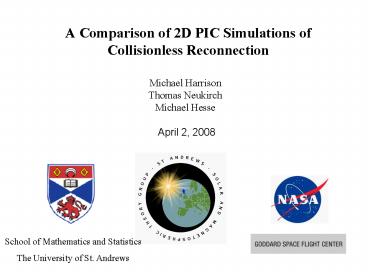A Comparison of 2D PIC Simulations of Collisionless Reconnection PowerPoint PPT Presentation
1 / 14
Title: A Comparison of 2D PIC Simulations of Collisionless Reconnection
1
A Comparison of 2D PIC Simulations of
Collisionless Reconnection
- Michael Harrison
- Thomas Neukirch
- Michael Hesse
- April 2, 2008
School of Mathematics and Statistics The
University of St. Andrews
2
Investigate the transition from an anti-parallel
initial field Configuration through to a
Force-Free field configuration.
Investigate the Morphology of the Off-Diagonal
components of the Pressure Tensor.
Motivation
Compare the Differences in the Reconnection
process between Initial Configurations with
Constant guide-field and cases with spatially
varying shear fields
Compare the Reconnection Rates For different
initial magnetic field Configurations.
3
Normalisations and Simulation Parameters
- Times are normalised to inverse ion cyclotron
frequency. - Lengths are normalised to the ion inertial
length. - The ratio of the electron plasma frequency and
electron cyclotron frequency is set to a
numerical value of 5. - A time step is used.
- The mass ratio is set equal to 1. We are in the
process of increasing this to more realistic
values.
4
Anisotropic Maxwellian DistributionFunction
5
Extended Distribution Function
- Have to find periodic solutions of the
differential equations. - The case gives anti-parallel field
configuration - The case gives linear force-free
equilibrium (Bobrova et al.) - Can use the parameter to vary the shear
field while keeping
constant - Can investigate the transition from a pressure
balanced equilibrium to a force-free equilibrium.
6
Case
- Magnetic field solution is a reverse field
configuration at - Force balance maintained by plasma pressure.
- Can add varying magnitudes of constant guide
field.
We have investigated the reconnection process as
you make the transition from zero guide field
through to . Also
compared this to the linear force-free case.
7
The Component of the Current Density with
the Flux Function Overplotted (Force-Free Case)
8
The Structure of the Diffusion Region
- The electron equation of motion
- The y component of the electric field can be
written as - Is found that the gradients of the off-diagonal
terms of the pressure tensor are the dominant
contributions to at the X-Point.
9
Example for Linear Force-Free Case
10
Simulation Snapshots at Time of Max Reconnection
Rate
Force-Free
11
The Off-Diagonal Components of the
PressureTensor -
Force-Free
12
The Off-Diagonal Components of the
PressureTensor -
Force-Free
13
Reconnected Flux and Reconnection Rates
We expect strong guide field cases to have a
slower reconnection rate than those with weak
guide field.
14
Future Work
- Carry out comparison reconnection simulations for
equilibria with spatially varying shear field
. - This can be done by using the extended
distribution function for different values of
and solving for periodic solutions. - Carry out a similar investigation of the
reconnection rates. - Carry out a similar investigation of the
off-diagonal components of the pressure tensor as
you make the transition from no shear field to a
force-free field. - Carry out force free simulations with low
- Carry out simulations for higher mass ratios

